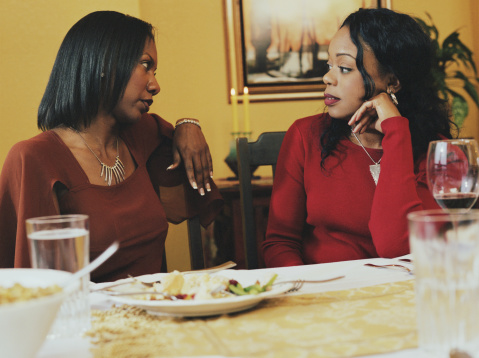How To Protect Your Spouse From Your Family - Page 3
Share the post
Share this link via
Or copy link

Source: Yellow Dog Productions / Getty
Last week, Tamar Braxton‘s partner David Adefeso confessed that he took a stern approach when introducing his family to his lady love. Simply put, Adefeso told his relatives that they didn’t have a choice when it came to accepting the reality star — they could either accept her or risk losing him completely. Though his words may seem harsh, when it comes to in-law relationships, it’s the job of each partner to check their respective families and protect the relationship. But exactly how does one go about guarding their relationship from the sometimes treacherous territory of in-law affairs? Continue reading to find out.
Understand that the family you create is the priority
One of the hardest but most important lessons for new families to understand is that the family you create should always take priority over the family that you come from. At some point, you will have to choose. Your children will appreciate that you prioritized to keep your family unit intact over sparing your meddling sister’s feelings.

Source: Hiraman / Getty
Present a united front
If you and your partner have agreed that your family has crossed a boundary, don’t throw your partner under the bus with comments like “My wife didn’t like it when…” or “My husband doesn’t want you to…” That is a cop-out. It completely absolves you of any involvement in the matter and leaves room for divisive tactics to penetrate. Instead, present a united front with “we-centric” verbiage. “We didn’t like x,y,z” or “We were made to feel uncomfortable when x,y,z happened.”

Source: Gregory E Betz / Getty
Accept that your family might be upset with you
Love MadameNoire? Get more! Join the MadameNoire Newsletter
We care about your data. See our privacy policy.
Speaking of cop-outs, protecting your marriage from the in-laws means that sometimes, you will not be able to keep the peace. You will have to stand up for your partner and that may mean that your folks are upset with you. The sooner you make peace with that, the better off you will be. Failure to stand up to your family will ultimately lead to resentment in your marriage.

Source: Klaus Vedfelt / Getty
Set boundaries
It’s up to each partner to establish boundaries with their respective families. You can’t expect your husband to be the one telling your mom that she’s not welcome to show up at your home unannounced or your wife to be the one to tell your father that misogynistic commentary won’t be tolerated in your home.

Source: Willie B. Thomas / Getty
Enforce boundaries
Talking to your folks about boundaries without enforcing them is nothing but lip service if you’re not going to enforce them.

Source: Amana Images Inc / Getty
Do not allow them to speak poorly of your partner
This should go without saying, but you should never allow your relatives to feel comfortable speaking negatively about your partner in your presence. You should always be the one to shut down snide remarks and nasty comments — whether your spouse is around to hear them or not.

Source: NickyLloyd / Getty
Don’t betray your spouse’s trust
If there is personal information that you know your spouse does not want your family to know, don’t betray their trust by going behind their back and spilling their tea. Your mom doesn’t need to know everything.

Source: Vladimir Vladimirov / Getty
Don’t make excuses for bad behavior
Call out bad behavior on the part of your family instead of excusing it. We become accustomed to the dysfunction of our families and often expect our partners to do the same, which is unfair. If your brother makes a nasty remark to your spouse, “Oh, he’s just like that” is not an acceptable response. Check your brother and apologize to your partner.

Source: LaylaBird / Getty
Stand on your own two feet
We all need help from time to time, but there’s a big difference between accepting a little help and dependency. It’s going to be really difficult to check grandpa’s racist rhetoric when he’s paying your rent or even worse, you’re living under his roof.

Source: kali9 / Getty
Speak up for your kids
If your family is mistreating one of your children (or your partner’s children) or doing something that makes them uncomfortable, you should be the one to step up and nip it in the bud. Don’t let your partner have to be the one who has to step to your relatives. This will cause your partner and your kids to lose confidence in you.
Related Tags
in-laws-

Meet Dominique Fils-Aimé, The Haitian-Canadian Star Redefining Jazz For A New Generation: ‘This is My Vision' [Exclusive]
-

9 Famous Lesbian Women Who Were Married To Men
-

Cooking With Purpose — How Brittney Williams Honors Her Caribbean Roots Through Food
-

Be Rooted: How Jasmin Foster Built A Lifestyle Brand For Black Women, By Black Women








